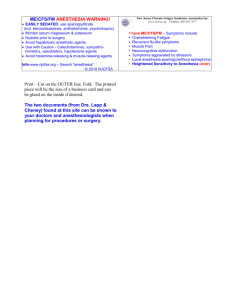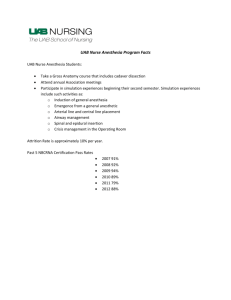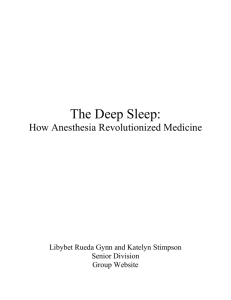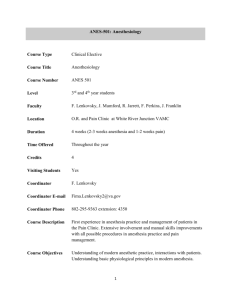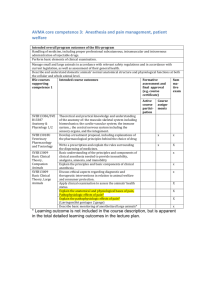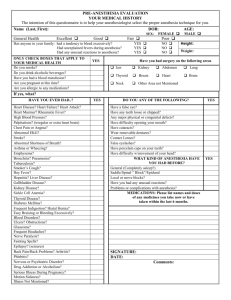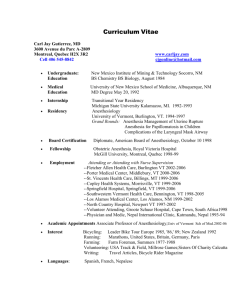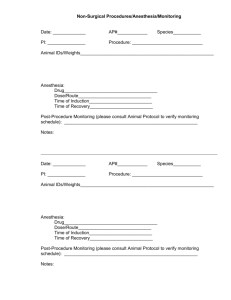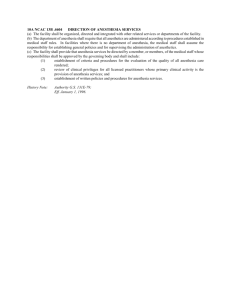Anesthesiology, Yesterday, Today and Tomorrow
advertisement
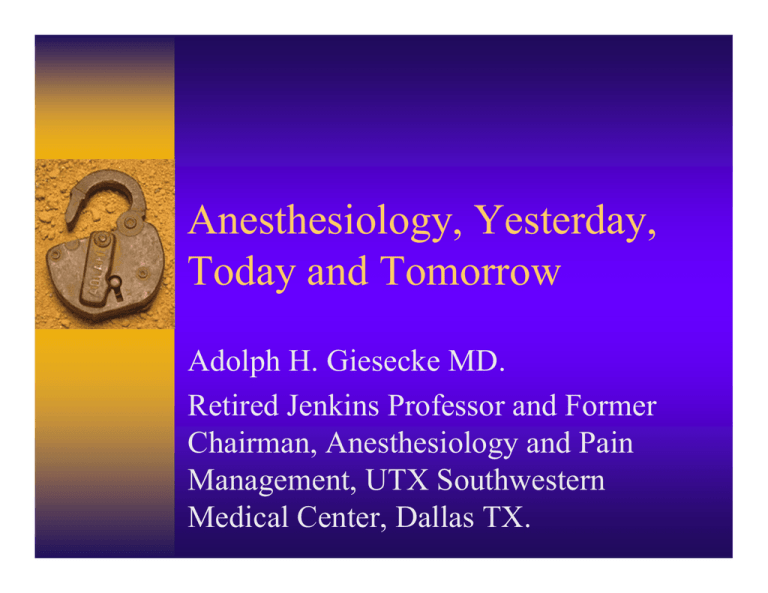
Anesthesiology, Yesterday, Today and Tomorrow Adolph H. Giesecke MD. Retired Jenkins Professor and Former Chairman, Anesthesiology and Pain Management, UTX Southwestern Medical Center, Dallas TX. The First Anesthesiologist. 1 ♦"And the Lord God caused a deep sleep to fall upon Adam, and he slept." Genesis 2:21 . Managing Pain Before Anesthesia ♦ Local application of cold water, ice or pressure. ♦ Plants and extracts. ♦Coca leaves chewed and saliva dripped into injured areas or open wounds Inca Shamans. ♦Alcohol or/with opium or hemp – “soporific sponge.” ♦ Hypnosis Opium ♦ Most common, ♦ Opium poppy, Papaver somniferum, ♦ Mandragora or mandrake from Atropa mandragora, ♦ belladonna from the Morning Glory, ♦ marijuana or Cannabis indica. In those “dark” days many patients approached surgery as through facing execution, an often appropriate assessment of uncontained risks, including pain, hemorrhage, shock and postoperative infection. The easiest pain to bear is someone else’s. Seishu Hanaoka, 1760-1835. 2 ♦ “Angel of Medicine.” ♦ Duty to relieve pain. ♦ “Tsusensan” 1805. ♦ Mother and wife volunteered. ♦ Breast cancer removed with tsusensan 10/13/1805. Hanaoka 1805 Golden Epochs of Anesthesiology I. Inhalation anesthesia,1846. II. Regional anesthesia, 1884. III. Intravenous anesthesia, 1932. IV. Neuromuscular blockers, 1942. V. Precision anesthesia, 1986. Golden Epochs of Anesthesiology I. Epoch of inhalation anesthesia, 1846. ETHER DAY. 3 ♦ Successful public demonstration 10/16/1846 at MGH. ♦ Ether Dome, now a national shrine. William Thomas Morton 181968. 3 ♦ Clothing merchant, swindler, dentist, medical student. ♦ Attended Wells’ demonstration of N2O in 1845. ♦ Idea of more potent agent, ether from Jackson. ♦ Patented “Letheon.” Ether ♦ “Sweet vitriol” discovered 1275 by Spanish chemist Raymundus Lullius. ♦ 1540, synthesis of ether described by German scientist, Valerius Cordus. ♦ Swiss physician and alchemist Paracelsus discovered the hypnotic effects of ether. Crawford Williamson Long (1815-1878). 4 First to use ether for surgery. “Discoverer of anesthesia?” 03/30/1842 painless removal of neck tumor after dropping ether on a cloth (anesthesia fee 0.25). Discovery unpublished, predates Morton’s public demonstration by 4 years. The anniversary of Long’s great accomplishment, March 30th, is celebrated in the United States as “Doctor’s Day”, and all medical specialties are honored. Sir Humphrey Davy (1778 -1829) ♦ Superintendent of Thomas Beddoes's Pneumatic Institute. ♦ Rx pulmonary tuberculosis by inhaling various gases, N2O, H2, O2, and CO2. Humphrey Davy. 4 ♦ 1800 Researches, Chemical and Philosophical: Chiefly Concerning Nitrous Oxide. ♦ He described inhaling N2O himself and obtaining relief from a painful condition. ♦ He suggested N2O might be used for surgery, 44 years before Horace Wells. Drawing from the 18th century depicting the recreational use of nitrous oxide - laughing gas Horace Wells (1815 - 1848). 5 • Attended a demonstration of N2O conducted by Quincy Colton, 12/10/1844. • Noticed that a man intoxicated by N2O lacerated his leg, and felt no pain or recall. Horace Wells. •The next day, Wells asked Colton to administer N2O, while an associate extracted a tooth. ♦Demonstrated N2O at Harvard 01/1845, patient cried, students hissed“Humbug.” ♦Addicted to chloroform. ♦Arrested for throwing acid on prostitutes, committed suicide in jail. ♦Pushed a known toxin to unconsciousness. Inhalation landmarks ♦ John Snow (1813-58), preventive medicine, first full time anesthesiologist. ♦ James Simpson (1811-70), Chair of Midwifery Edinburgh, OB anesthesia 01/1847, chloroform 1847. ♦ Henry Boyle, first anesthesia machine 1917. ♦ Ralph Waters, CO2 absorbtion 1924. ♦ Ivan Magill, endotracheal intubation 1920. Golden Epochs of Anesthesiology ♦ II. Epoch of regional anesthesia, 1884. Karl Koller 1857-1944 ♦ Ophthalmologist in Vienna. ♦ Dissatisfied with GA for eye surgery. Restless and coughing during surgery, vomiting and pain postop. ♦ 1884 with Sigmund Freud introduced cocaine from Erythroxylon coca. Landmarks in Regional Anesthesia ♦ William Halstead, nerve blocks of face and arm 1886, addicted to cocaine. ♦ August Bier, spinal anesthesia 1898. ♦ Virginia Apgar promotes regional analgesia in childbirth 1930. Virginia Apgar 1909-1974. 6 ♦ Devised a system for grading the newborn’s condition, “Apgar Score.” ♦ Promoted R.A. which relieved labor pain without interfering with the baby. ♦ Featured on US Postage stamp. Golden Epochs of Anesthesiology ♦ III. Epoch of intravenous anesthesia, 1932. John S. Lundy, 1894-1973 ♦ 1903 Barbitone synthesis by Fischer, Berlin, Nobel Prize. ♦ 1932 Evipan used IV by Weese Schraff, & Rheinoff. ♦ 1934 Lundy, Mayo Clinic used Sodium Pentothal. Golden Epochs of Anesthesiology IV. Epoch of neuromuscular blockers, 1942. Neuromuscular Blocking Drugs ♦ 1942 Curare first used clinically by Griffith and Enid Johnson in Montreal. Paleopharmacology of curare Paleopharmacology of curare NMBAs ♦ 1812 Waterton brought “woorara” from Guiana to England, inoculated 3 donkeys, 2 died, one survived with tracheostomy and IPPV. ♦ 1857 Claude Bernard published that curare blocked the NMJ. ♦ 1940 Bennett used curare to modify seizures induced by metrozol. Claude Bernard, 1857 Golden Epochs of Anesthesiology ♦ V. Epoch of precision anesthesia, 1986. Ellison Pierce MD, Pres. ASA 1984. ♦ ABC 20/20, “The Deep Sleep, 6000 will suffer brain damage” 4/22/1982. ♦ Standards for Basic Anesthetic Monitoring ASA House of Delegates 10/21/1986. ♦ Anesthesia Patient Safety Foundation 1984. Harvey Cushing, 1869-1939 Pulse Oximetry, 1973, 1983. Modern Anesthesia Machine. Anesthesia Mortality. 7 ♦ 1:1000 in 1960. ♦ 1:240,000 in 2002 Golden Epochs of Anesthesiology ♦ I. Inhalation anesthesia,1846. ♦ II. Regional anesthesia, 1884. ♦ III. Intravenous anesthesia, 1932. ♦ IV. Neuromuscular blockers, 1942. ♦ V. Precision anesthesia, 1986. References ♦ 1. And the Lord God caused a deep sleep to fall upon Adam, and he slept." Genesis 2:21 . ♦ 2. Matsuki A: Seishu Hanaoka, a Japanese pioneer in anesthesia. Anesthesiol 1970; 32:446-50. ♦ 3. Fenster J M: Ether Day. Harper Collins Publishers. New York, 2001. ♦ 4. Sykes: Essays on the First Hundred Years of Anaesthesia. Robert E. Kreiger Publishing Co. 1972. References 2 ♦ 5. Wolfe & Menczer: I Awaken to Glory. Boston Medical Library, 1994. ♦ 6. Caton D: What A Blessing She Had Chloroform. Yale University Press, New Haven, 1999. ♦ 7. Voelker R: Anesthesia-related risks have plummeted. JAMA 1995; 273: 445-6.
